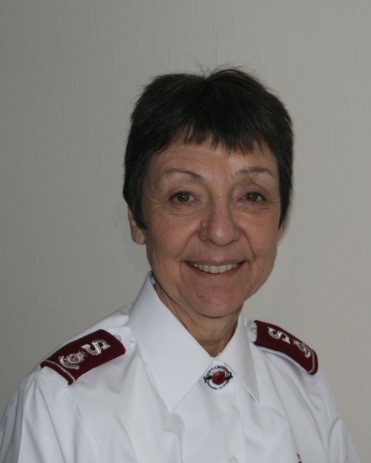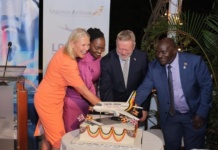African Voice interviews Lieutenant Colonel Diane Payne, Salvation Army officer, who has been in contact with victims of modern slavery in the UK.

Modern Slavery is a growing concern within the African community in the UK. Going back from 2011 forward, over 7,000 victims have been rescued. Actually, the number year on year has increased. By the time the report came out last year, the number has increased by 300% from year one. Last year, 2017, the number of victims who came in for the service were1,554.
I have been working in the Anti-Trafficking and Modern Slavery Unit of The Salvation Army since 2014 and my role is very much one of raising awareness among those who have responded and so I interview potential victims of modern slavery face to face. I also carry out various training sessions when requested.
I do help with coordinating training volunteers, because The Salvation Army obviously rely on quite a lot of volunteers who help to take victims from a place of rescue to a place of safety. That is because The Salvation Army first, is the main contract holder for the position of care, coordination of the position of care of victims of modern slavery since 2011.
At the Salvation Army, our concern is for the victim, so we ensure that anybody who is a potential victim will be offered safe accommodation, they will be given support to help them with whatever it is they need. It could be that they need to be taken to a safe house. They will be given a case booker and the case booker will work with them to help them in what they need. If they wanted to have legal help, to help them get restitution from their employers, the perpetrators of the trafficking and modern slavery, obviously, the case booker, helps with that as well.
The Salvation Army, work in 128 different countries, one of the countries we are working in and have a project proudly, is Nigeria. We are working in the area of raising awareness, we have been into schools, we are going into villages, in trying to help identify victims who could need help to return safely into the community. We do work in other countries as well and try to prevent them from falling prey to traffickers in their own countries.
Can you try to describe the kind of trauma some of these individuals you have met go through?
I can talk to you about a particular person that l interviewed. This person was raised in the village by her grandparents. She did primary school in the village, when she got to secondary school age, she was brought into Lagos, to stay with her auntie, the idea was that she would be enrolled into secondary school while she stayed with this auntie. But what happened was, she was enrolled in secondary school but she was told that before she went to school that there were a whole list of chores she had to get through and she was not permitted to leave to walk to school until she completed those chores. So some days she was late to school, some days she didn’t even make it to school at all. At the end of the year, she failed. Her aunt and her uncle said, they were not going to pay for her to resit the examination, so they took her out of school. From that point on, she became their domestic servant. So she started living in the servant quarters, she was on call 24/7 and they treated her very badly.
Her grandmother found out what was going on and organised for her to go and stay with another relative. They told her that she would be sent to the UK. By this time, she was aged about 15/16. So she jumped at the idea of going to the UK. She thought she was coming to the UK to study but when she got here, she found herself again, this time with two men and a boy. The man had been widowed and she was sent to work in this house, she did everything for them. She was caring for the boy, doing their shopping, cleaning the house and they were abusing her. That is one story that I can tell you.
Another one, which I was not involved with, was another girl, at the age of ten was sent to work with a family in Lagos, this family came to the UK and brought her with them. They did not enroll her in school. She had to do all the domestic work. Two years after, she got to this country, they then enrolled her to go to school. She was instructed not to speak with anyone, or allowed to make friends, not allowed to bring friends to the house and they really did not treat her well at all. Then when she was 16, the master started to make sexual advances at her, so she eventually ran away and found herself at a Nigerian church, the church took her in and helped her, looked after her, she went to school, passed her exams. She wanted to go to university. At this point, she needed to get her I.D papers, to get herself legally in the UK. She ended up at the detention center. It was at the detention center that she was identified as a potential victim of modern slavery. She then received the help. Once the victim is identified, he or she cannot be returned home. The person is entitled to a minimum of 45 days reflection and recovery period in the UK with an outreach worker or a caseworker to work with the person to find out the best way forward for him or her. If the victim was illegal in the country, the caseworker will help to apply for asylum so that the person can put in their papers for consideration. The Salvation Army organise that as well.
Please explain the difference between human right abuse and domestic slavery?
Human right can cover so many areas. When we are talking about domestic slavery, we are talking about house help in Nigeria. I have lived and worked in Nigeria. In Nigeria, often it will be the way someone who comes from the village to join the rest of the family in town is being treated, if they are allowed to get education and then go on to work, the house chores are shared with other members of the family, they are treated equally like the rest of the family, then that is fair. It will help both the family in the village and the one in the town. But when on the contrary it doesn’t work, they are treated differently, I am talking about in Nigeria, if they are the only one doing all the chores, they are not allowed to go to school, not given any freedom, they work long hours, they are not paid well or not paid at all. That is abuse.
When you come to the UK, the legislation in this country requires that someone who is working should receive the minimum wage. Also, there should be set hours, with a contract so that the person is treated with dignity and respect. But what happens where the house help situation turns into domestic slavery is when a person finds himself in a house where they are not allowed any freedom. Although they have their papers but they are being taken away from them to disempower them, they are not allowed to go out alone, they often don’t have a private space, they may even just have a mat that they roll out in the kitchen at night and actually sleep in the kitchen, they may have a scrap left over from the family meal to eat and they are treated very badly.
How can the Diaspora community support the work you are doing at The Salvation Army?
We are trying to raise awareness. if you see what is going on, for instance you know that there is a house in your street, where a young person is dressed more shabbily, never seem to go out with the rest of the family but if they ever go out, they will be quiet, not make eye contact, not engage in conversation, they may look afraid and withdrawn, they may attend church or mosque but they are not allowed to join in with other young people and they are very much under the control of the ‘madam’ and the ‘master’. If something does not look right, if it looks like someone is not being treated well, then we are saying, please do something about it.
There is a Modern Slavery helpline, where you can ring and confidentially leave the information. If you are in contact with that young person, there is a Salvation Army 24/7 referral line where you can refer that person to be interviewed as a potential victim of modern slavery. We are asking the community to keep their eyes open and to do something if they see that someone is suffering. It is the community who can help bring an end to domestic servitude in this way.
To report concerns, seek advice, or get help, call the UK Modern Slavery Helpline 0800 012 1700 or visit the website www. modernslaveryhelpline.org.
For more information about the work of The Salvation Army go to www. salvationarmy.org.uk/human-trafficking
Kindly follow us on twitter:@AfricanVoice2









